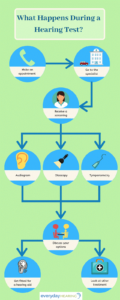Despite how important hearing tests are, they’re not particularly integrated into our lives. If you were headed in for a hearing test, you might not know what the process has in store. That’s why we’ve made a shortlist of five things to keep in mind during a hearing test.
-
The process of a hearing test
The average hearing test takes about 10 minutes – a pretty quick ordeal for such an important procedure. It will usually start like any other doctor’s appointment, with the hearing specialist asking you a couple of questions.
Afterwards, they’ll take you into the examination room, and you’ll undergo a few procedures. These can vary based on your answers to the specialist’s questions, as well as the resources they have on hand.

-
Are there different kinds of hearing tests?
The most common procedures are an audiogram (listening to noises and responding), an otoscopy (peering into the ear with a concentrated flashlight), and a tympanometry (a probe being inserted into the ear canal).
A tympanometry is the most intrusive of these procedures, and even then, it won’t hurt or feel as bad as it sounds. Depending on the course of the appointment, you may have to go through any combination of these, but like we said, it will never take too much time out of your day.
-
How much do they cost?
Maybe this is the real reason you or your loved one haven’t considered a hearing test. You might be noticing hearing loss, but you can still hear almost everything, so why spend the money on a hearing test?
Well, this is because hearing loss can be a precursor to (or a symptom of) a larger issue. Even if it isn’t, if left untreated, hearing loss can lead to some serious physical and mental health concerns.
A hearing test can cost up to $250 dollars without insurance. If you have insurance, then hearing tests are usually covered, but it’s always worth checking with your provider.
-
Are they different for the elderly?
When testing the hearing of the elderly, the process is largely the same as what we listed above. However, in patients with cognitive impairments – like dementia – they may need to be re-instructed on the rules of the test.
If they’re having a lot of difficulty, the audiologist may change the response needed to one that engages the patient more. This could be getting them to raise their hand or saying “yes” out loud when they hear the sound being played in the headphones. This may make the test a bit more hands-on than regular tests, but the mechanics are the same.
-
Are online hearing tests a good substitute?
While looking around, you may have found a multitude of online hearing tests and thought “why would I go in to get a hearing test when I can just get one online?”
Well, that’s a fair thought, since it could save you the trip, but is it really a fitting substitute for an in-person hearing test? Well, no, not really. It can serve as an adequate check to see if your stereoscopy (hearing the same volume in both ears) is at a good level.
In reality, it’s not even close to a real hearing test. Real-life hearing tests are standardized, and don’t rely on your headphone or computer quality to gauge your hearing level. Nothing beats the real thing!